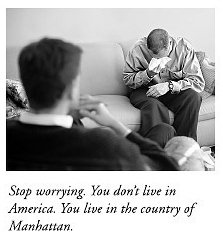Daily Office:
Monday
¶ Matins: As we pray our way through this Good Monday of the most desperately-needed resurrection in the history of secular affairs, it is necessarily with some bitterness that we remember, at the newspaper’s own invitation, that the Times thought that Richard Press’s Op-Ed art was funny enough in 2000 to be funny now. I am still crying alongside this man.
¶ Tierce: Doing the math:
The canal still remains the most fuel-efficient way to ship goods between the East Coast and the upper Midwest. One gallon of diesel pulls one ton of cargo 59 miles by truck, 202 miles by train and 514 miles by canal barge, Ms. Mantello said. A single barge can carry 3,000 tons, enough to replace 100 trucks.
Yes! The Erie Canal still works. And as for the mode of transportation that sent the canals into decline…
¶ Sext: Here’s a study to file away, along with Judith Harris’s findings generally: college students, who are, for the most part adolescents, take their political cues (as well as most other ones) from their peers, not their professors. Patricia Cohen reports.
Oremus…
§ Matins. I remind my readers for the umpteenth time that I am a registered Republican. I have not voted for a Republican candidate since 1984, when I was besotted by the idiotic idea that a terrible president would be the more amply discredited by the gift of four more years in which to screw up. I was thirty-six years old, and I ought to have known better.
I’m sorry, Mr Dickhead Therapist, but I do live in America.
§ Tierce. In an AP story in the Times, a key congressman has this to say:
The public is way ahead of policymakers in recognizing trains as an attractive alternative to cars and planes, said Representative James L. Oberstar, a Minnesota Democrat who is chairman of the House Transportation and Infrastructure Committee.
§ Sext. Daniel Klein, an economist at George Mason, relocates the problem.
That may be, said Daniel Klein, an economist at George Mason, but those results don’t necessarily mean there isn’t a problem. Mr. Klein, whose research has shown that registered Democrats vastly outnumber Republicans among faculty in the humanities and social sciences at American colleges and universities, maintains that the focus on the liberal-conservative split is misdirected. Such terms are vague and can be used to describe everything from attitudes about religion and family to the arts and lifestyles, he said.
The real issue, said Mr. Klein, who calls himself a libertarian, is that social democratic ideas dominate universities — ideas that play down the importance of the individual and promote government intervention.
Such “academic groupthink” means that the works of such thinkers are not offered enough, he argues. “A major tragedy is that they’re not getting exposed to the good stuff,” he said, citing the works of John Stuart Mill, Adam Smith, Friedrich Hayek and Milton Friedman.
Prof Klein is probably right — and there’s probably a good reason why even Smith and Mill (who certainly are read in colleges) take on a faintly “socialist” coloration from the context of the humanistic syllabus.


